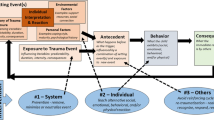Abstract
From the city streets of New Haven, Connecticut, the rural mountains of Appalachia, and the heart of San Francisco, students across the nation are coming to school with traumatic histories that are greatly impacting their school performance. Schools are recognizing the impact of trauma and beginning to adopt trauma-informed practices. When school systems approach students through a trauma lens, they are better equipped to provide the educational and social–emotional supports necessary to help students reach their potential. The following commentary reviews the implementation efforts of three different trauma-informed school programs and their use of the multitiered interventions to address the differing needs of trauma-exposed students. Implications for future directions are addressed, including the need for support for more intensive educator professional development.
Similar content being viewed by others
References
Blaustein, M. (2013). Childhood trauma and a framework for intervention. In E. Rossen & R. Hull (Eds.), Supporting and educating traumatized students (pp. 3–21). New York: Oxford University Press.
Cevasco, M., Rossen, E., & Hull, R. (n.d.). Best practices for supporting and educating students who have experienced domestic violence or sexual victimization. Retrieved from http://www.nea.org/home/62845.htm#ssts.
Chafouleas, S., Johnson, A., Overstreet, S., & Santos, N. (2015). Toward a blueprint for trauma-informed service delivery in schools. School Mental Health,. doi:10.1007/s12310-015-9166-8.
Darling-Hammond, L., Wei, R. C., Andree, A., Richardson, N., & Orphanos, S. (2009). Professional learning in the learning profession: A status report on teacher development in the United States and abroad. Dallas, TX: National Staff Development Council.
Dorado, J., Martinez, M., McArthur, L., & Leibovitz, T. (2016). Health Evironments and Response to Trauma in Schools (HEARTS): A school based, multi-level comprehensive prevention and intervention program for creating trauma-informed, safe, and supportive schools. School Mental Health. doi:10.1007/s12310-016-9177-0.
Every Student Succeeds Act. (2015). S. 1177, 114th Congress.
Fishman, B., Marx, R., Best, S., & Tal, R. (2003). Linding teacher and student learning to improve professional development in systemic reform. Teacher and Teacher Education, 19(6), 643–658.
Johnson, C. (2006). Effective professional development and change in practice: Barriers science teachers encounter and implications for reform. School Science and Mathematics, 106(3), 1–12.
Lane, K. L., Rogers, L. A., Parks, R. J., Weisenbach, J. L., Mau, A. C., Merwin, M. T., et al. (2007). Function-based interventions for students nonresponsive to primary and secondary prevention efforts: Illustrations at the elementary and middle school levels. Journal of Emotional and Behavioral Disorders, 15, 169–183.
Layne, C., Beck, C., Rimmasch, H., Southwick, J., Moreno, M., & Hobfall, S. (2009). Promoting “resilient” posttraumatic adjustment in childhood and beyond. In D. Brom, R. Pat-Horenczyk, & J. Ford (Eds.), Treating traumatized children (pp. 13–47). London: Routledge.
Perry, D., & Daniels, M. (2016). Implementing trauma-informed practices in the school setting: A pilot study. School Mental Health. doi:10.1007/s12310-016-9182-3.
Poekert, P. (2012). Examining the impact of collaborative professional development on teacher practice. Teacher Education Quarterly, 39(4), 97.
Shamblin, S., Graham, D., & Bianco, J. (2016). Creating trauma-informed schools for rural Appalachia: The partnerships program for enhancing resilency, confidence, and workforce development in early childhood education. School Mental Health. doi:10.1007/s12310-016-9181-4.
Substance Abuse and Mental Health Services Administration. (2014). SAMHSA’s concept of trauma and guidance for a trauma—informed approach. HHS Publication No. (SMA) 14-4884. Rockville, MD: Substance Abuse and Mental Health Services Administration.
Sugai, G., & Homer, R. (2006). A promising approach for expanding and sustaining school-wide positive behavior support. School Psychology Review, 35(2), 245–259.
Turner, C. (2015). Ruling in Compton Schools case: Trauma could cause disability. Retrieved from http://www.npr.org/sections/ed/2015/10/01/445001579/ruling-in-compton-schools-case-trauma-could-cause-disability.
Acknowledgments
We would like to thank Dr. Karen Weston, Ron Hertel, Jeff Reiser for their contributions to this commentary.
Author information
Authors and Affiliations
Corresponding author
Ethics declarations
Conflict of interest
Lisa Weed Phifer declares that she has no conflict of interest. Robert Hull declares that he has no conflict of interest.
Ethical approval
This article does not contain any studies with human participants or animals performed by any of the authors.
Rights and permissions
About this article
Cite this article
Phifer, L.W., Hull, R. Helping Students Heal: Observations of Trauma-Informed Practices in the Schools. School Mental Health 8, 201–205 (2016). https://doi.org/10.1007/s12310-016-9183-2
Published:
Issue Date:
DOI: https://doi.org/10.1007/s12310-016-9183-2




